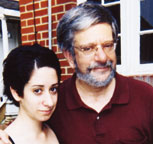

 |
|||
| The
Last Word Offering a hand over the generational divide Over 30 and making a trade-off: lose some authority and gain some trust. by Alan Ehrenhalt During freshman orientation at Brandeis University in 1964, I sat in terror while an upperclassman named Joel Doerfler described the state of relations between the students and the college administration. It was all-out war. "You will be pitted against the slickest operators in the business," he told the incoming Class of 1968. "Some of you will quite literally 'live in fear.' But think not of your transgressions as acts of moral disobedience, but rather as creative victories. Get away with as much as you can, but don't get caught." The speaker's immediate rage was directed at a particular campus policy–restricting male and female students from entertaining each other in their rooms. But his words were intended also as an introduction to the inescapable facts of inter generational life: adults in positions of power were dangerous. They didn't understand anything. They were the enemy and must be treated as such. Needless to say, there was no Joel Doerfler inciting freshmen to rebel against sexual rules. Those rules fell a long time ago–in fact, before my own class had even graduated. But what struck me this time wasn't the attitude of the students, it was the posture of the adults. My college years–at one of the most politically liberal institutions in America at that time–were marked by daily collisions between nervous post-adolescents and middle-aged adults struggling to maintain authority: a registrar who barked out sarcastic directions to bewildered freshmen trying to understand course requirements; distinguished faculty who invited questions and then humiliated the questioners; stern deans with crew-cuts who warned that violating the rules meant an indelible smudge on a permanent record. They are gone now, all of them. In their place are professors and deans who come from my generation–people for whom it is a social error to treat students with even a trace of rudeness–let alone arrogance or condescension. They have reached the age at which one might finally be able to intimidate the young, but that is the last thing they wish to do. What they want is to be nice people. "We need to take some risks and get to know each other," Oberlin president Nancy Dye told the freshmen "Each of us needs to respect each others' differences." The dean of students urged parents to "contemplate your own first day of college, remembering your own cluelessness and feeling grateful that your son or daughter seems to have a better grip than you did." I don't recall any adult saying things like that in 1964. I
sat in the balcony of Finney Chapel listening to all the professions
of adult niceness and was amazed to find myself thinking of the
climactic line from Roberto Benigni's film, Life is Beautiful.
"This," the narrator says, "is the sacrifice my father
made for me." It is no small sacrifice. In tearing down the old cultural wall that separated adolescent and adult we have given up some valuable things. Most of the adults who ruled during my youth used their authority to communicate a coherent set of values that their children could either accept or reject, once they grew up. My generation has difficulty doing that. When we talk about traditions and values, even those of a proud college nearly two centuries old, we do it with a bow toward the ironic sensibilities of the teenagers we have just raised. It's hard to serve up tradition straight any more. That's a loss that deserves at least a moment of mourning. Still, it's equally difficult to visit a campus these days without thinking seriously about the gains. The adults and the kids don't seem like creatures from different planets. They may not speak quite the same language, but they share cultural trappings in a way that we and our parents never did. My daughter and I both know the lyrics to "American Pie." That doesn't erase the realities of generational difference, but it does make the whole notion of parental and pedagogical intimidation difficult, if not ludicrous. Most of us have lost the ability, as middle-aged adults in the 21st century, to make a credible case to our children about eternal truths. What we can do instead is smile at them, joke about our own failings, tell them to relax, have a nice day, answer their e-mail, and learn something in the process if they can. The older I get, the more that seems like a decent trade. Alan Ehrenhalt is the father of Oberlin student Elizabeth Ehrenhalt. He is the executive editor of Governing Magazine and author of The United States of Ambition and The Lost City.
|
|
back to top |
 Joel
Doerfler didn't enter my mind for more than three decades, but memories
of his speech suddenly came back as I watched my daughter's orientation
to the Class of 2005 at Oberlin, a few hours down the road from
Brandeis, but culturally and demographically much the same.
Joel
Doerfler didn't enter my mind for more than three decades, but memories
of his speech suddenly came back as I watched my daughter's orientation
to the Class of 2005 at Oberlin, a few hours down the road from
Brandeis, but culturally and demographically much the same.